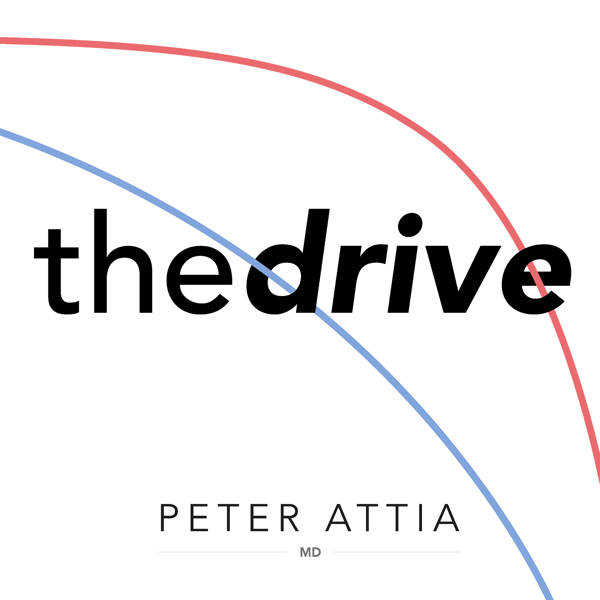The impact of stress on our physical and emotional health | Robert Sapolsky, Ph.D. (#51 rebroadcast)
The Peter Attia Drive
Peter Attia, MD
4.7 • 7.3K Ratings
🗓️ 24 April 2023
⏱️ 136 minutes
🧾️ Download transcript
Summary
View the Show Notes Page for This Episode
Become a Member to Receive Exclusive Content
Sign Up to Receive Peter’s Weekly Newsletter
In this episode, Robert Sapolsky, Ph.D., discusses the widespread impact of stress on our physical and emotional health as well as the mechanisms by which it can precipitate chronic illness, dementia, depression, and more. He also provides insight into the factors that contribute to the stress response (and our ability to handle it) such as social rank, personality, environment, and genetics. Lastly, we discuss how our behavior is altered in the face of stress and how that not only has a pervasive effect on a personal level, but also on society as a whole in how we interact with each other.
We discuss:
- Background, interest in stress, and Robert’s time in Kenya studying baboons [2:45];
- Physiology of a stress response, and why it’s ingrained in our DNA [9:45];
- Individual variation in the response to stress, and how everyone has a different optimal level [19:45];
- How social rank and personality differences affect our stress response [26:30];
- What’s happening in the brain when faced with stressful situations? [35:00];
- What makes the human brain different than all other species? [44:15];
- Imprinting stress to your kids epigenetically [48:00];
- The role of stress on memory and the consequences of hypercortisolemia [53:00];
- The impact of subjective socioeconomic status and social media on stress levels and health [57:45];
- Tips for managing stress in the modern world [1:13:15];
- What Robert learned about himself studying the social behavior of baboons [1:25:30];
- The multilayered factors behind every human behavior, the context of “good and bad”, and exploring the human capacity of the wild extremes of violence and altruism from moment to moment [1:30:15];
- PMS: How two women with identical hormone levels can have completely different emotional experiences [1:34:45];
- How much of a role do genes play in depression and other emotional states? [1:38:00];
- Why is cortisol elevated under sleep deprivation? [1:46:00];
- The impact of stress on cancer [1:50:30];
- The impact of stress on atherosclerosis, dementia, addiction, and depression [1:57:00];
- Impulsiveness, impaired judgment, and lack of empathy in times of stress [2:01:45];
- What advice would Robert give his 25-year-old self? [2:08:45]; and
- More.
Connect With Peter on Twitter, Instagram, Facebook and YouTube
Transcript
Click on a timestamp to play from that location
| 0:00.0 | Hey everyone, welcome to the Drive Podcast. |
| 0:13.0 | I'm your host, Peter Atia. |
| 0:14.8 | This podcast, my website, and my weekly newsletter, I'll focus on the goal of translating |
| 0:18.7 | the science of longevity into something accessible for everyone. |
| 0:22.4 | Our goal is to provide the best content in health and wellness, full stop, and we've |
| 0:26.6 | assembled a great team of analysts to make this happen. |
| 0:29.4 | If you enjoy this podcast, we've created a membership program that brings you far more |
| 0:33.2 | in-depth content if you want to take your knowledge of this space to the next level. |
| 0:37.3 | At the end of this episode, I'll explain what those benefits are, or if you want to learn |
| 0:41.1 | more now, head over to peteratiamd.com forward slash subscribe. |
| 0:46.3 | Now, without further delay, here's today's episode. |
| 0:51.1 | Welcome to another special episode of The Drive. |
| 0:54.2 | For this week's episode, we're going to re-broadcast my conversation with Robert Sapolsky, |
| 0:59.6 | which was originally released back in April of 2019, about four years ago. |
| 1:05.0 | Many of you may recognize that name because Robert has written some incredible books, including |
| 1:09.5 | the very popular, why Zebras don't get ulcers, a guide to stress, stress-related disease, |
| 1:15.6 | and coping. |
| 1:16.6 | I had first seen Robert speak about a year and a half prior to my interview with him, |
| 1:20.5 | and I remember thinking during his talk, this is the first time I'm really being convinced |
| 1:26.4 | of the true pathology of stress. |
| 1:28.6 | I think prior to that, I'd always heard the old adage that stress could kill you, but |
| 1:32.1 | I kind of dismissed it as, yeah, yeah, yeah, and we used to think that stress caused ulcers, |
... |
Please login to see the full transcript.
Disclaimer: The podcast and artwork embedded on this page are from Peter Attia, MD, and are the property of its owner and not affiliated with or endorsed by Tapesearch.
Generated transcripts are the property of Peter Attia, MD and are distributed freely under the Fair Use doctrine. Transcripts generated by Tapesearch are not guaranteed to be accurate.
Copyright © Tapesearch 2025.

